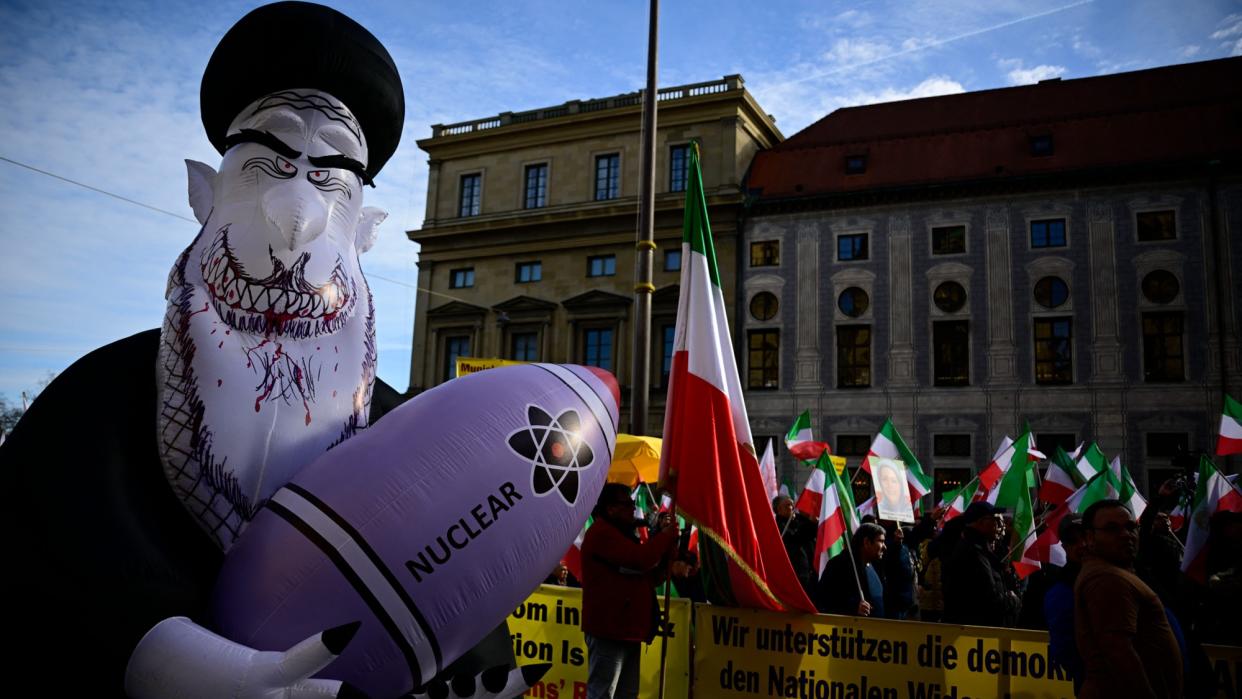Iran at the nuclear crossroads

Iran has again increased its stockpile of uranium enriched to near weapons-grade levels, according to a confidential report by the United Nations nuclear watchdog.
The Islamic Republic now possesses 142.1kg uranium enriched up to 60% purity, the International Atomic Energy Agency (IAEA) said in a document seen by The Associated Press. That's an increase of 20.6kg since the last report in February.
Uranium enriched to 60% is "just a short, technical step away from weapons-grade levels of 90%", said AP News. Only about 42kg of uranium enriched to 60% is needed to create an atomic weapon, if the material is further enriched to 90%. IAEA chief Rafael Mariano Grossi has warned that Tehran has enough uranium enriched to near-weapons-grade levels to make "several" bombs.
But after direct conflict broke out for the first time with long-time foe Israel against the backdrop of the Gaza war, the Biden administration is "pressing European allies to back off plans to rebuke Iran for advances in its nuclear program", said The Wall Street Journal. The US is aiming to lower tensions with Iran, which it fears could become more unpredictable after the death of its president Ebrahim Raisi in a helicopter crash last week.
What's the state of Iran's nuclear program?
Iran was one of the original signatories of the 1970 Non-Proliferation Treaty (NPT), the most important global agreement on nuclear weapons. In 2003, after the American invasion of Iraq, a fatwa by Supreme Leader Ayatollah Khamenei declared nuclear weapons to be "forbidden under Islam" and decreed that the Republic would never acquire them.
But the second Bush administration's "unrealistic insistence" that Iran agreed to "zero enrichment" of uranium turned it into "a matter of national pride", said The New York Times.
During the Obama years, the regime kept enriching uranium and "adding to its stockpile", wrote John Ghazvinian, director of the Middle East Center at the University of Pennsylvania.
The Joint Comprehensive Plan of Action on nuclear weapons was negotiated in 2015, based on regulations established by the NPT. This lifted some sanctions against Tehran in exchange for strict limits on its nuclear activities.
However, Donald Trump unilaterally withdrew the US from the deal in 2018 and subsequently "campaigned on maximum pressure" on Tehran, which only "added to Iran's defiance".
The Biden administration has tried unsuccessfully to revive the deal, while Iran has "quickly stepped up enrichment", said AP News. Last September, it barred IAEA inspectors from monitoring its program.
Iran is now "not far off" being nuclear-armed, said The Washington Post in April. A senior Iranian lawmaker and former military commander warned then that Iran could enrich uranium to the 90% threshold in "half a day, or let's say, one week". Estimates of how long Iran would need to turn that enriched uranium into nuclear weapons "vary between months and about a year", said Reuters.
Is Iran capable of building nuclear weapons?
The outbreak of direct conflict with Israel – a country with an "undeclared but widely acknowledged nuclear arsenal" and military superiority – has "provoked a change of tone in Tehran" on weaponisation, said Ghazvinian.
The Republic had agreed to hold negotiations with the IAEA on 20 May – but those meetings "fell apart" after the helicopter crash that killed Raisi on 19 May, said AP News. But in a "sharp departure" from the nation's long-term policy, Iran's leading officials are now "openly threatening to build and test a nuclear bomb", said The Atlantic.
Raisi's death has "dramatically shifted the landscape", said Ghazvinian. It has "created an opportunity" for the hard-liners who are "far less allergic to the idea of going nuclear than the regime has been for decades".
The war in Gaza, a possible change of US president in November and a "domestic power vacuum" in Iran after the death of Raisi, the assumed successor to the supreme leader, could create "a brief window in which Iran could pull out all the stops", said Ghazvinian, and "surprise the world by testing a nuclear device".
The country's thousands of advanced centrifuges and its large stockpile of enriched uranium has led some to adopt a "might as well" argument. "If we've already come this far, the argument goes, then why not just go for a bomb?"